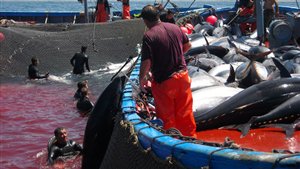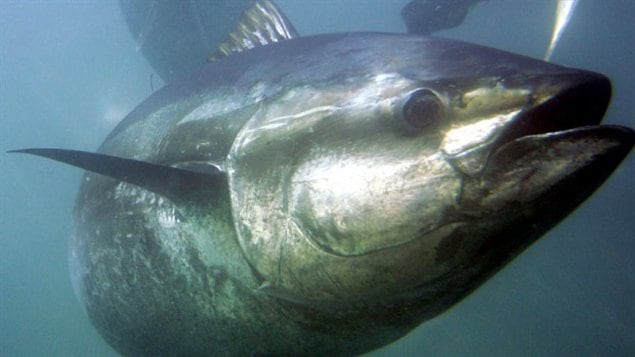As an international tuna meeting begins in Cape Town, South Africa, conservationists are urging Canada not to ask for an increase in its tuna quota.
The 46 member International Commission for the Conservation of Atlantic Tunas (ICAAT) gets underway today and will consider quotas and better tracking methods, such as electronic catch recording documentation to replace paper records which are susceptible to fraud.

According to the Washington-based Pew Charitable Trusts, a non-profit organization that advises governments on sustainable fishing, actual catch of Atlantic bluefin exceeded quotas by 57 percent between 2008 and 2011. They say that highlights the need for an electronic tracking system to curb illegal fishing., spurred by the high prices for the fish.
The biggest consumer of the fish is Japan, where last year a 269 kg bluefin tuna sold for a record 56.49 million yen (about $746,797 Cdn) Tokyo’s Tsukiji fish market. The previous record was 32.49 million yen (about $429,500 ).
ICCAT’s 2013 bluefin catch quota is 1,750 metric tons in the western Atlantic and 13,400 metric tons in the Eastern Atlantic,
Susanna Fuller of the Ecology Action Centre in the eastern port city of Halifax, Nova Scotia, said Canada would set a dangerous precedent if it asks members of the ICCAT to allow fishermen to catch more of the lucrative, but vulnerable fish.
A Canadian fisheries department spokesman refused to comment on the discussions or say what Canada will propose at the meeting.
Conservationists are also suggesting the ICCAT should a establish catch limits for the shortfin mako, the fastest swimming shark, and blue sharks, to prevent overfishing of the species.
The catch of blue sharks has increased to 70,000 tons in 2011 from 54,000 tons in 2008, according to ICCAT data. Most sharks are consumed in the form of shark-fin soup.
The ICCAT also monitors the conservation of bigeye tuna, yellowfin tuna, albacore, swordfish and billfishes.
The international meetings wrap up on November 25.







For reasons beyond our control, and for an undetermined period of time, our comment section is now closed. However, our social networks remain open to your contributions.